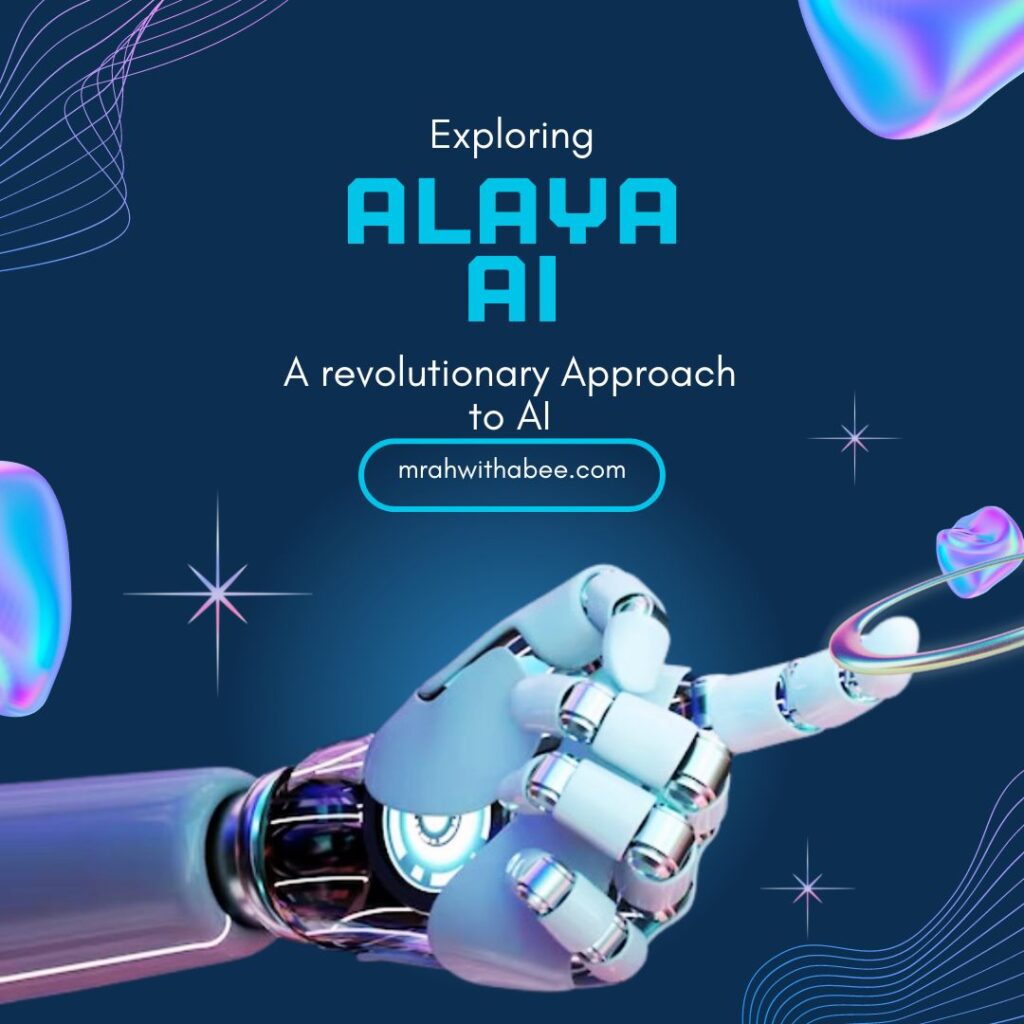In the ever-evolving world of artificial intelligence (AI), a platform that enables efficient data sharing, user privacy, and a secure digital environment is of paramount importance. Alaya AI is a cutting-edge platform designed to help individuals and businesses manage, share, and monetize their data efficiently through decentralized networks. It revolutionizes AI’s interaction with data through emerging AI capabilities, privacy control, and economic benefits for data contributors.
In this post, we’ll dive into the following key aspects of Alaya AI:
- What is Alaya AI?
- How does Alaya AI enable data sharing and privacy?
- How does Alaya AI benefit businesses and individuals?
- Alaya AI’s Groundbreaking Platform: A New Era for Web3 and AI Integration
1. What is Alaya AI?
Alaya AI is an advanced platform that focuses on data monetization and decentralized collaboration. It allows individuals and organizations to securely share data in a decentralized network and earn from it. It distinguishes itself by seamlessly integrating Blockchain technology with AI.
The platform uses AI to enhance and streamline data interactions, ensuring that are secure, respect privacy, and remain transparent. Furthermore, Alaya AI enables individuals and businesses to unlock the value of their data by offering tools for privacy management, AI integration, and economic rewards in a decentralized digital environment.
According to its website, Alaya envisions a future where AI and data work together in harmony to generate value for everyone involved. This innovative approach dismantles centralized data ownership, fostering a collaborative environment. It promotes shared access and decentralized control, empowering users to benefit from their data. This shift not only promotes transparency but also creates a new opportunity for data monetization and responsible use.
2. How Does Alaya AI Enable Data Sharing and Privacy?
One of the biggest challenges in the world of data is the sharing and utilization of data while safeguarding privacy. Alaya tackles this issue by employing decentralized technology, which allows data contributors to retain control over their information. Here’s how it works:
- Decentralization: Instead of relying on centralized systems, Alaya operates on decentralized networks. This innovative structure ensures that no single entity has complete control over the data, which significantly addresses the risk involved in data breaches and misuse. Through data distribution across a network of contributors, this AI enhances security and transparency. This approach not only protects individual privacy but also fosters a collaborative environment where the users feel safe to share their data. Finally, this decentralization promotes a more resilient and trustworthy data ecosystem.
- Privacy Controls: This platform lets data owners set strict privacy rules, specifying who can access their data and its use. By allowing users to tailor access permissions, this platform provides an environment that is transparent and can be trusted. This approach not only protects individual privacy but also encourages responsible data sharing, as a result, the value of data is aligned with the contributor’s interests and goals.
- Secure Data Exchange: Using advanced cryptography and blockchain technology, this platform facilitates secure exchange between the data contributors and AI systems. This enhanced security not only protects the data but also guarantees that contributors receive rewards for sharing their information. Furthermore, the reward systems incentivize participation, which allows individuals and organizations to gain economic benefits from their contributors. These salient features enhance the overall quality of data available for the AI platform.
This decentralized approach nurtures trust, allowing individuals and companies to share their data confidently, knowing they won’t compromise their privacy or lose control over their assets.
3. How Does Alaya AI Benefit Businesses and Individuals?
The appeal of Alaya reaches both business organizations and individual users, providing a variety of advantages that position it as a valuable platform in the AI and data economy.
For Businesses Organizations:
- Access to High-Quality Data: One of the key challenges in AI development is obtaining access to diverse, high-quality data. This platform ensures privacy, creating a decentralized data pool contributed by multiple anonymous users. This data enhances AI model accuracy, enabling more effective applications in predictive analytics and automation. By giving access to a broad spectrum of data sources, this platform enables the organization to train its models with richer datasets, which improves its decision-making and insights.
- Enhanced AI Capabilities: Alaya integrates with AI tools, helping businesses leverage gathered data to train their algorithms. This direct connection allows companies to utilize high-quality, diverse data effectively while enhancing their AI capabilities. As a result, companies can develop more enhanced AI solutions that are equipped to tackle complex tasks and adapt to dynamic environments.
- Cost Efficiency: By using decentralized networks for data, businesses can cut costs and gain better control over their data. This approach enhances cost-effectiveness and empowers organizations to make data-driven decisions.
For Individuals:
- Monetization of Personal Data: One of the platform’s most notable features is its capacity to empower individuals to monetize their data effectively. Most people don’t value the data they possess and do not realize that it can be a significant asset. This platform lets individuals contribute data to the network and earn compensation, turning it into passive income. This model fosters a sense of ownership and incentivizes responsible data sharing.
- Data Control: Individuals often hesitate to share personal data due to concerns about privacy and potential misuse. This platform empowers contributors to control who accesses their data and how it is used. This level of control ensures that users can safeguard their privacy while enjoying the benefits of the opportunities that data sharing presents.
- Transparency: It uses blockchain to track data usage, giving contributors transparency on how their data is used. Furthermore, the contributors can monitor transactions in real-time, ensuring their data is managed responsibly. This transparency builds trust between contributors and businesses using this platform.
4. Alaya AI’s Groundbreaking Platform: A New Era for Web3 and AI Integration
Alaya AI, a leader in data solutions, is transforming the future of AI with its new Open Data Platform (ODP), designed to integrate seamlessly with Web3 ecosystems. This platform addresses the increasing demand for efficient data management in decentralized applications. Alaya AI’s ODP seeks to provide exceptional accessibility, security, and scalability for AI data infrastructure, benefiting server companies like OpenAI, Tesla, and other AI-driven projects. The platform has been chosen for Season 8 of the Binance MVB project, marking a significant milestone in its journey and providing an excellent opportunity to strengthen ties with Binance Labs and BNBCHAIN.
Alaya AI’s Open Data Platform: Pioneering a Collaborative AI Ecosystem
The ODP forms the backbone of Alaya AI’s mission to establish an open, transparent, and collaborative AI ecosystem. Alaya AI embraces Web3’s decentralized principles, allowing secure and transparent data utilization for all. The platform utilizes smart contracts for data governance, ensuring trust and privacy while improving accessibility through blockchain-based security measures. Alaya AI’s commitment to decentralization is both timely and forward-thinking, positioning it to lead the next wave of growth in the AI and Web3 sectors.
Transforming Data Annotation and Tracking: Alaya AI’s Advanced Toolset
At the core of the platform, it is offering its innovative Data Auto-Labelling Toolset. This toolset revolutionizes the efficiency of data annotation, significantly reducing the time developers spend on manual data labeling. By automating the labeling process for large datasets, Alaya AI enables teams to concentrate on more critical tasks, thereby accelerating project timelines and lowering costs. The toolset is adaptable to various data types, allowing for seamless integration into different workflows.
Another groundbreaking feature is Dynamic Visual Data Segmentation and Discrete Tracking, which improves the accuracy of real-time data segmentation. This technology equips applications with continuous monitoring capabilities for complex datasets, such as visual or sensor data. With discrete tracking, Alaya AI’s platform can monitor individual data points over time, delivering insights that static analysis cannot provide. This is vital for advancing autonomous driving, healthcare diagnostics, and smart city initiatives.
The Future of AI and Data Monetization with Alaya AI
As artificial intelligence evolves, platforms like Alaya AI are leading the charge in transforming how data is shared, secured, and monetized. Therefore, it creates a new paradigm in the AI economy with decentralized networks and privacy controls for data profit. It allows businesses to access data for better AI models, benefiting all stakeholders involved.
If you want to learn more about Alaya AI and explore its potential for your personal or business needs, visit their official website here.
FAQs
1. What is Alaya AI?
Alaya AI is an advanced platform designed for data monetization and decentralized collaboration, allowing individuals and businesses to securely share and earn from their data.
2. How does Alaya AI ensure data privacy?
Alaya AI employs decentralized technology, enabling data contributors to retain control over their information and set strict privacy rules regarding data access and usage.
3. What are the benefits of using Alaya AI for businesses?
Businesses can access high-quality data, enhance their AI capabilities, and achieve cost efficiency by leveraging a diverse data pool contributed by anonymous users.
4. How does Alaya AI help individuals monetize their data?
Alaya AI allows individuals to contribute their data to the network and earn compensation, turning personal data into a potential source of passive income.
5. What features does the Data Auto-Labelling Toolset offer?
The Data Auto-Labelling Toolset automates the labeling process for large datasets, significantly reducing manual labor and accelerating project timelines.
6. What is Dynamic Visual Data Segmentation and Discrete Tracking?
This feature enhances real-time data segmentation accuracy, enabling continuous monitoring of complex datasets, such as visual or sensor data, for deeper insights.
7. How does Alaya AI promote transparency in data usage?
Alaya utilizes blockchain technology to track data usage, allowing contributors to monitor how their data is used and ensuring responsible management.
8. What role does the Open Data Platform (ODP) play in Alaya AI’s mission?
The ODP is central to Alaya AI’s goal of creating an open, transparent, and collaborative AI ecosystem that integrates seamlessly with Web3 ecosystems.
9. How does Alaya AI contribute to the Web3 ecosystem?
By embracing Web3 principles, Alaya AI enables secure, decentralized data utilization, enhancing accessibility and fostering collaboration among users.
10. Where can I learn more about Alaya AI?
To explore Alaya and its offerings further, you can visit its official website for more information on how it can benefit your personal or business needs.
Thank you for reading, for more interesting articles please visit our homepage.



